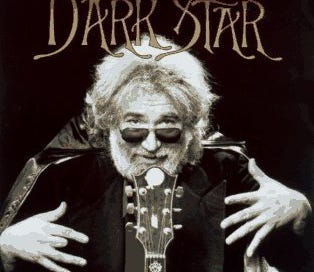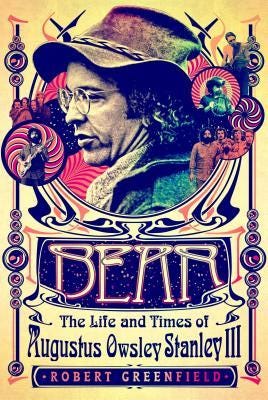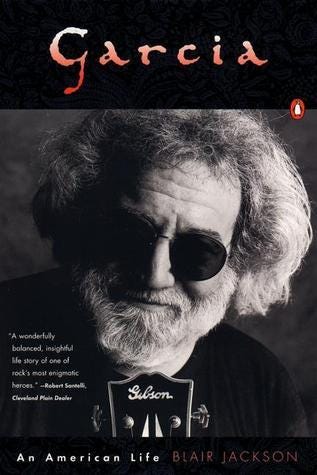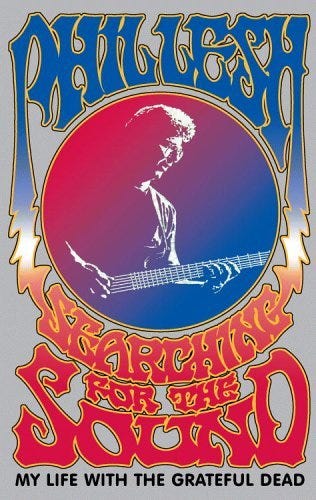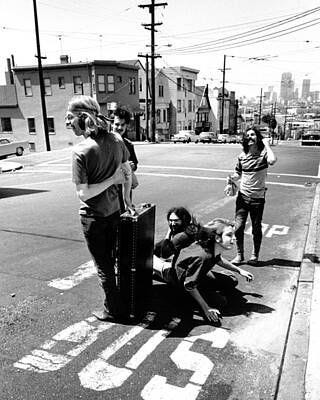Jerry, Phil & Bear: Dead (auto)bios review
Messrs. Garcia, Lesh, Augustus Owsley Stanley III: my Grateful takeaways
Due to vagaries of library queues, I'm covering these in the order checked out. A companion to my last entry on Jimi, Kesey, Leary, and Robert Stone. And group studies of the Grateful Dead collectively next up on this print-to-play shuffle…
Bear: The Life + Times of Augustus Owsley Stanley III. Robert Greenfield. Goodreads 3 stars.
While near the end of his life, when veteran Rolling Stone chronicler of the heyday of classic rock Greenfield finally meets Bear in his still impressive flesh, there's some softness in his formidable subject, Owsley Stanley III doesn't come across as a particularly likeable fellow. Yet having chosen to commit himself to St Elizabeth's asylum (where Ezra Pound was held) in his early teens, it shows how dreadful was his state of mind even before the decades of indulgence in not only LSD but an all-meat diet, plus the usual added chemicals of the era. Unlike the GD, Bear doesn't appear to have cared much at all for bettering the lives around him, in flawed but idealized ways. He's out to peddle skull-icon belt buckles to Chelsea Clinton, scam hippies into drug deals, natch, or evade being husband or father.
I wish Greenfield had delved into the Wall of Sound. He treats it in cursory fashion, and seems despite his career hanging out before many a stage, or likely back of it, not to convey much interest in how Bear engineered the precarious but monumental edifice separating notes spatially for high fidelity. As besides the altered states of pharmaceutical invention, Bear's other claim to contributing to late 20c progress appears his embrace of loopy climate change global flooding from his Australian eyrie, there seems less to applaud this self-made countercultural legend for. An object lesson in smug selfishness?
A morality tale it's not, in Greenfield's workmanlike account. I can't imagine many reading this not already enraptured by the purple haze of the period. But as I was a kid then, the antics of those a bit my elders admittedly intrigues me as I age, and as I seek to comprehend the promise that such scions as Bear inherited to create meaningful change. He chose dubious methods for his skillful means, in the lab and in the outback, and seems to have never been able to mature into a responsible citizen.
Dark Star: An Oral Biography of Jerry Garcia. Robert Greenfield. Goodreads 3 stars.
As I expected after reviewing Greenfield on Bear and Timothy Leary respectively. While some fans of the Grateful Dead bristle at the extended decline described by his wives, colleagues, and their children, I found it fairly balanced. For quibble that "technically" the cigarettes, booze, and junk food habits did him in rather than heroin, Jerry's heart, obesity, and sleep apnea surely weren't eased by addiction to whatever "Persian opium" meant in street terms translated into prolonged damage for far too long.
The testimonies of those in his circle, some critique, lacked the band's input. But this appeared in its first stages of composition a year after Garcia's death in 1995. As Greenfield explains in his preface, and he reinforces in the coda, his project collates, rather than comments upon, the recollections and the reactions of those who knew Garcia intimately. To a point. For as more than one confidante here confides, Jerry created a cocoon against the demands of touring to support his own appetites, those of his mates however defined, and those who relied on the GR to make a living as their fame accelerated.
He also stinted on commitments, could be ruthless or oblivious about those who failed to meet his demands whether as spouses or as partners in business, as he blithely shunted aside problems about management, and ignored too often the interventions, information, and insight that concerned people provided. Might lunch organic, but pig out post-gig at a convenience store on ice cream and a hot dog.
Perhaps Dark Star, as its title symbolizes in subtle ways, attests to the ideals he was seen to embody for maybe millions of his fellow citizens, as well as the follies to hedonism, rationalization, and self-delusion so common not only to his hippie postwar generation, but those of us before and after the peaks of the mythic Sixties. His potential realized and squandered serves as cautionary tale, or legend.
Garcia: An American Life. Blair Jackson. Goodreads 4 stars.
I rank this alongside publicist Dennis McNally's Long Strange Trip as the best surveys of respectively Jerry and the band. While sharing with Robert Greenfield's oral history Dark Star a comprehensive narrative of the entire arc of Garcia's life, career, music, and legacy, I aver that Jackson, as a veteran journalist, possesses the skills to provide a study which incorporates Robert Hunter's lyrics and the songs which in their melodic and technical structures articulate the reasons why his subtitle might resonate. He doesn't belabor the rationale.
Jackson begins with a glimpse of Garcia's paternal roots in La Coruña, in Spanish Galicia, demonstrating a broad context within which to place Garcia and his colleagues, as they gravitated towards San Francisco, the Peninsula, and the California scene of beatnik to hippies. In the opening, Jackson admits he's leaning towards the better nature inherent in his flawed subject. Like Greenfield, another longtime witness to many a classic rock spectacle, Jackson draws on intimate knowledge, personal interviews, and wide research. He takes time to document details, such as where in the Santa Cruz Mountains the family getaway cabin lurked (Lompico, built 1945) which other guides to this topic never bother to mention. I found it comprehensive without being nitpicking. While the author tends towards interpreting events directed by Garcia, or not so managed, with a generous spirit, he calls out Jerry when the record, or testimony, demands truth.
One correction: Wally Legate, an early crony in Palo Alto, probably didn't attend the College of the Redwoods (Eureka, CA) but the U. of Redlands down at the other end of the Golden State, if Wally's drug trip revealed none majesty of a "gingerbread" chapel. The latter, formerly Baptist-founded, campus in the Inland Empire has that. I doubt a public junior college has a match...But overall, that's the only slip I caught, with only one misspelling, rare among publications nowadays. It finds the right pacing, like an ideal gig of the man himself.
Searching for the Sound: My Life With the Grateful Dead. Phil Lesh. Goodreads 4 stars.
I waited three months for this from my library. Meanwhile reviewing my way, if as a non-Deadhead, yet interested in the band's cultural and musical legacies, through Long Strange Trip, So Many Roads, and No Simple Highway as the major biographies of the Grateful Dead which appeared in the 2010s. Plus apt books on Jerry Garcia, Bear, and "Why the GD Matters." All this gave me a brisk crash course.
So, as I'm a noodler on the bass, thus curious about Phil Lesh's approach to integrating sonic fluidity rather than stolid timekeeping into an instrument that when he picked it up in the middling Sixties had barely begun to be explored (outside of Motown's James Jamerson?), this autobiography delivers the inside scoop on the thump, beat, melody, and above all, the improvising on stage of his top lineup.
That's enriched by Phil's chemically infused tangents. Others have waved these transports away as hippie ravings. But as somebody who has never dropped acid and likely never will, I found these lush insights enlightening about how they liberated his talents on the four strings. Points deducted, as too scant about what became the Wall of Sound (n.b. late 2024, there appeared a study of this innovation).
He also regaled with how the Acid Trips, the communal dance, and the compositional telepathy lifted, at least on their '68-'72 and to me by far most important recordings, the Dead to life. His asides about Plato's warnings about the power of sounds, in the aftermath of Altamont and Woodstock, Egyptian experiences at the Pyramids, and the inspiration provided him by the fans all deepen this nimble read.
I'd conclude that this delves into the intricate, and often inarticulate in words rather than tunes, elixir which he and his partners concocted. He opens up glimpses across the neuron threshold, allowing raw outliers like myself a heady sense of what the GD aspired towards. Although the actual tracks on wax laid down, and their peak performances, don't gain the breadth I'd hoped for, Lesh does manage to coax open the doors of his altered perceptions, and offers those on the outside an approximation of what the counterculture dreamt of, as well as the hangover and recriminations. As Phil advises, never marry anyone you meet in a bar. Glad to know that with maturity, albeit delayed, came inner peace.
P.S. My Goodreads links offer highlights from my reading, key quotes w/grace “notes…”

